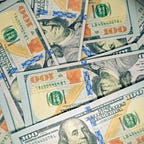THE IMPACT OF GOVERNMENT EXPENDITURE ON ECONOMIC GROWTH OF THE COUNTRY
Economic growth of the country:
Economic growth can be defined as a rise in the amount of economic products and services in comparison to two time frames. This can be expressed as conventional or a specific number. However different measures are sometimes employed, cumulative economic growth is typically assessed in terms of GNP or GDP. A rise in the production of products and services in an economic system is referred to as economic growth. It can be aided by advances in capital equipment, labour force, innovation, and human resources. Economic growth is generally assessed in terms of an increase in the collective market price of new products and services generated, as assessed by GDP estimates.
How will government expenditure affect the economic growth of the country?
Income and Capital Spending are two kinds of government spending. Compensation instalments to government labourers, instalments to pastors, and other income consumptions are instances of income uses. Capital consumption brings about the production of resources in the economy, like streets, spans, and instructive organizations. Since we’ve learned about the government’s sources of revenue and expenditures, a budget deficit is a measure of a company’s financial health in which expenses outnumber revenues. It is also the total of the Revenue and Financial Account Deficits. The following are some of the many explanations for the negative correlation between size of government and economic expansion:
• The cost of extraction: Government expenditure necessitates expensive funding options. The federal government is unable to spend funds without first obtaining funds from another source. All of the financing methods for government expenditure have negative repercussions.
• The cost of displacement: Government expenditure causes private-sector activities to be displaced. Every pound spent by the government implies a $1 less in the economy’s economic sector. This slows growth because economic forces determine how resources are allocated in the private sector.
• The negative multiplier cost: Spending by the government funds detrimental intervention. Parts of the federal budget are utilised to fund activities that have a pronounced negative impact on the economy. Many regulatory organisations, for example, have relatively tiny budgets, but they inflict significant costs on the organization’s operational sector.
• The direct sponsorship cost. Government spending upholds ruinous choices. Various organization programs support fiscally annoying decisions. Government help urges people to pick unwinding. Joblessness assurance programs give an inspiration to remain jobless.
- The social discipline cost. Government spending incapacitates valuable choices. Government programs much of the time weaken fiscally sure decisions. Saving is vital for help with giving subsidizing to new pursuits, yet the inspiration to save has been subverted by government programs that support retirement, housing, and tutoring.
Impact of economic growth in United Kingdom:
The greatest expansion in government spending as % of GDP happened during the two World Wars. In the post-war time frame, government spending as % of GDP was higher because of the making of government assistance state — NHS, government assistance advantages and spending on committee lodging.
